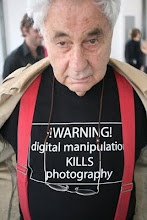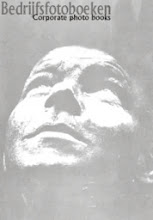ON AND OFF THE WALLS: BUREAUCRATICS
Posted by Rollo Romig
Among the eight portfolios included in Moving Walls 17, the Open Society Institute’s latest documentary photography show, the most improbably delightful has to be “Bureaucratics,” by the Dutch photographer Jan Banning. “It started with the most horrible assignment I ever had,” Banning told me when when he dropped by our office yesterday. The job was in Mozambique: Banning’s editor had asked him to shoot pictures for a story on the decentralization of the administration of Dutch development aid. “That’s not something that makes your heart beat faster as a photographer,” he noted. To make it interesting for himself, he decided to shoot portraits of the bureaucrats themselves. Little did he know that this would be merely the first leg on an absurd odyssey that would take him through thousands of government offices, a world tour of what he calls “the shop windows of the state.”
Content dictated form. “What is bureaucracy?” Banning asked. “First of all, it’s square, so I used a square format. Second, it’s straight lines, and in the middle of that grid you’ve got this round being, this human being. And the camera is a metaphor for the local citizen who enters that space. So I always put myself directly in front of the desk or at ninety degrees to the desk, to get that Mondrian structure.”
The element of surprise was crucial. Given any warning, the bureaucrats would try to tidy their workspaces, but Banning wanted to see each office in all its cluttered glory, just as an everyday citizen would encounter it. It helped, he said, to have a collaborator, the writer Will Tinnemans. Together Tinnemans and Banning took an ambush approach: after wrangling permission from some top bureaucrat to roam the halls, the pair would walk in an office unannounced, and, if Banning liked what he saw, Tinnemans would immediately start interviewing the resident bureaucrat while Banning set up his gear. Before the bureaucrat knew quite what was happening, the shoot was over. (In the Netherlands, the project has resulted in two books: one, called “Everyday Power,” emphasizes Tinnemans’s reportage about bureaucrats; the other is a photobook called “Bureaucratics,” which has also been released here, by Nazraeli Press.) See also Martin Parr - New Typographies ...

Surinder Kumar Mandal, tax inspector, Bihar India
Jan Banning (b.1954, Netherlands) was born from Dutch-East-Indies parents. He studied social and economic history at the University of Nijmegen and has been working as a photographer since 1981. His documentary work, rooted in both art and journalism, has been exhibited and published widely in books, magazines and newspapers. The central concern in his work is the theme of state power; Banning has produced series on the world of government bureaucracy (which received a World Press Photo and several other awards) and the long-term consequences of war. Currently he is working on a portrait series of World War II “comfort women” in Indonesia.
About the Photograph:
“This photo is from the self-initiated project Bureaucratics, resulting in a book (published by Nazraeli) and travelling exhibition of 50 photographs: the product of an anarchist’s heart, a historian’s mind and an artist’s eye. It is a comparative photographic study of the culture, rituals and symbols of state civil administrations and its servants in eight countries, selected on the basis of polical, historical and cultural considerations: Bolivia, China, France, India, Liberia, Russia, the United States, and Yemen. In India I visited hundreds of offices of members of the executive. The visits were unannounced and the accompanying writer, Will Tinnemans, by interviewing kept the employees from tidying up or clearing the office. That way, the photos show what a local citizen would be confronted with when entering.”
“My photography nowadays has a conceptual, typological approach. In Bureaucratics, all photos have a square format (fitting the subject), are shot from the same height (that of the client), with the desk – its front or side photographed parallel to the horizontal edges of the frame – serving as a bulwark protecting the representative of rule and regulation against the individual citizen, the warm-blooded exception. They are full of telling details that sometimes reveal the way the state proclaims its power or the bureaucrat’s rank and function, sometimes of a more private character and are accompanied by information such as name, age, function and salary. Though there is a high degree of humor and absurdity in these photos, they also show compassion with the inhabitants of the state’s paper labyrinth.”
China: Jiang Ji Yuan (b. 1958) is chairman of the Art and Literature Association of Tai’an, Tai’an City, Shandong province. Monthly salary: 4,000 renminbi ($496).
France: Maurice Winterstein (b. 1949) works in Clermont-Ferrand for the Commission for the Advancement of Equal Opportunity and Citizenship at the combined administrative offices of the Auvergne region and the Puy-de-Dôme department. He also is in charge of the portfolio of religious affairs, Islam in particular. Monthly salary: € 1,550 ($ 2,038). The young lady next to him is Linda Khettabi (b. 1989), an intern pursuing training as a secretary.
India: Sushma Prasad (b. 1962) is an assistant clerk at the Cabinet Secretary of the State of Bihar (population 83 million) in The Old Secretariat in the state capital, Patna. She was hired "on compassionate grounds" because of the death of her husband, who until 1997 worked in the same department. Monthly salary: 5,000 rupees ($110).
Liberia: Lieutenant Samuel P.S. Kollie (b. 1955) is chief of the Traffic Station of the Liberia National Police in Kakata, Margibi County. He has no police car and no means of communication. When an accident is reported, Kollie at times takes a cab at the expense of the person reporting the accident. Monthly salary: 900 Liberian dollars ($16).
Russia: Sergej Michailovich Osipchuk (b. 1974) is the lone police officer in the village of Oktyabrsky, Tomsk province. He does not have a police car or one of his own—not even a bicycle. He doesn’t want to reveal his salary, but informed sources put the monthly salary of an officer of his rank and age at approximately 4,000 rubles ($143).
USA: Shane Fenton (b. 1961) is sheriff of Crockett County, Texas, and based in Ozona, the county seat. Monthly salary: $3,166.
Yemen: Alham Abdulwaze Nuzeli (b. 1982) works at the regional office of the Ministry of Tithing and Alms in the city of Al-Mahwit, Al-Mahwit governorate. Monthly salary: 12,000 rial ($67).
Bolivia – 2005
Mario Calizaya Condor (b. 1951) is deputy mayor in Betanzos, Cornelia Saavedra province. He completed elementary school only and subsequently was a farmer. Monthly salary: 1,200 bolivianos (133 €)
Russia: Sergej Michailovich Osipchuk (b. 1974) is the lone police officer in the village of Oktyabrsky, Tomsk province. He does not have a police car or one of his own—not even a bicycle. He doesn’t want to reveal his salary, but informed sources put the monthly salary of an officer of his rank and age at approximately 4,000 rubles ($143).
USA: Shane Fenton (b. 1961) is sheriff of Crockett County, Texas, and based in Ozona, the county seat. Monthly salary: $3,166.
Yemen: Alham Abdulwaze Nuzeli (b. 1982) works at the regional office of the Ministry of Tithing and Alms in the city of Al-Mahwit, Al-Mahwit governorate. Monthly salary: 12,000 rial ($67).
Bolivia – 2005
Mario Calizaya Condor (b. 1951) is deputy mayor in Betanzos, Cornelia Saavedra province. He completed elementary school only and subsequently was a farmer. Monthly salary: 1,200 bolivianos (133 €)
France – 2006
Roger Vacher (b. 1957) is a narcotics agent with the national police force in Clermont-Ferrand, Puy-de-Dôme department, Auvergne region. Monthly salary: 2200 €
India – 2003
Ram Prabodh Yadav (b. 1970) is sub-inspector (deputy inspector) of police in Maner Block district, State of Bihar. Monthly salary: 10,000 rupees (200 €)
USA – 2007
Rudy Flores (b. 1963) is one the 118 Texas Rangers state law enforcement officers, who cover 254 counties between them. He is based in Palestine, Anderson County, Texas. He is responsible for three counties. Monthly salary: $5000 (3720 €)
Liberia – 2006
Louise N. Smith (b. 1964) keeps files at the Department of Statistics of the Bureau for Immigration and Naturalization (BIN) in Monrovia. Monthly salary: 1,000 Liberian dollars (17 €), almost all of which is spent on transportation to and from work. Sometimes she receives nothing for three months, except for support from family in the United States.



























Geen opmerkingen:
Een reactie posten